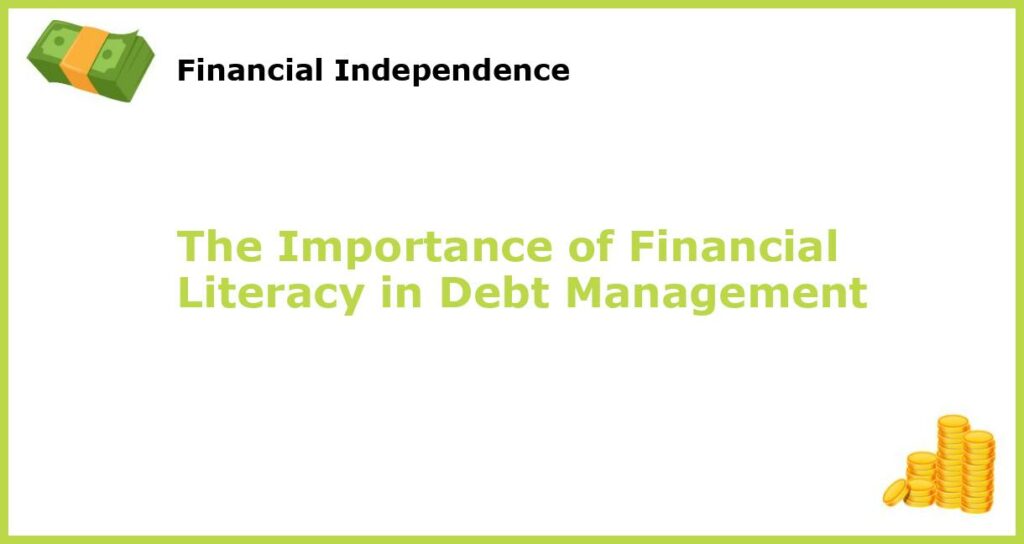Money makes the world go round – the more you have, the smoother your life will be. But what happens when you start having debt obligations, and the amount you owe starts piling up? Debt management is a crucial aspect of financial literacy, and people who understand their debts, budgeting, interest rates, debt repayment strategies, credit scores, debt-to-income ratio, borrowing responsibility, emergency funds, investing, and making informed decisions are more likely to stay financially afloat in the long run. Let’s dig deeper and see why these factors are essential for achieving financial success.
Understanding your Debts

Debt is not inherently bad, but when you don’t understand the different types of debts that you have, it can lead to an unbalanced financial situation. Good debts like mortgage and student loans are used to acquire assets or education that will appreciate with time. Conversely, credit card and personal loans may lead to destructive financial habits. Therefore, you need to know the basics, such as how much you owe, to whom, and the interest rates attached to each debt. Afterward, you can focus on paying your high-interest debts first, such as credit card debts.
Budgeting

Creating a budget requires a bit of effort, but it is worth it in the long run. With the knowledge of how much money you have coming in and how much you have going out, you can plan your spending effectively. Include all your debts expenses in your budget, and don’t forget about other costs like rent, groceries, transportation, and other bills. The goal of a budget is to have enough money to pay off debt and an additional amount of money to build savings. A budget will keep you accountable and help you avoid overspending.
Interest Rates

You must understand how interest rates work, their effects on your debt, and how to negotiate them with your creditor. High-interest rates can make your debt too expensive to pay, while low-interest rates can make your debt more manageable. Consider consolidating high-interest debts into a lower interest rate loan. It would be best to have a good credit score to qualify for loans with smaller interest rates. Therefore, financially literate individuals understand how to negotiate interest rates to their advantage.
Debt Repayment Strategies

There are several debt repayment strategies such as the avalanche method, snowball method, and debt consolidation. The avalanche method involves paying off high-interest loans first. On the other hand, the snowball method prioritizes paying off smaller balances first, then proceeding to larger debts. The idea is to get small successes that will build momentum to tackle larger debts. Debt consolidation is an opportunity to combine all your loans into one, which can be more manageable, such as a home equity loan. These strategies require careful consideration to find the one suitable for your lifestyle and debt levels.
Credit Scores

People with good credit scores usually have an easier time accessing loans, credit cards, or favorable interest rates. A credit score is a numerical representation of an individual’s credit history, such as their payment history, existing loans, credit utilization ratio, and length of credit history. Improving your credit score requires paying your bills on time, applying for only necessary credit, keeping your credit utilization ratio low, and having diverse credit types. Financially literate individuals understand why their credit scores matter and how to improve them.
Debt-to-Income Ratio

The debt-to-income ratio measures the amount of debt an individual has compared to their net income. It includes recurring debt payments such as mortgage, credit card balances, and car payments. Your debt-to-income ratio should not exceed 30% of your net income. A high debt-to-income ratio may indicate to creditors that you are not in a position to pay back additional debt. It is, therefore, essential for financially literate individuals to calculate their debt-to-income ratios and monitor them regularly.
Borrowing Responsibly

Debt is not inherently bad; how you acquire it makes a significant difference. Borrowing should be the last resort, but when you need to borrow, do so responsibly. Only take loans that you need and can afford to pay back, avoiding impulse buying or buying on credit. Keep your spending habits in check by adhering to your budget, and keeping your loans balances low. Ultimately, borrowing responsibly can prevent you from falling into a cycle of debt or worsening an already bad credit score.
Emergency Funds

You never know what life may throw your way. Whether it is a health emergency, car breakdown, or job loss, you must have an emergency fund to cushion the impact. The general guideline is to have a savings account to cover up to six months’ worth of living expenses. An emergency fund can an individual in financial emergencies and prevent them from getting deep into debt. Financially literate individuals prioritize saving consistently and building up their emergency funds.
Investing

Investing is a great way of making your money work for you by growing your wealth with time. Earning a decent rate of return requires careful analysis and choosing the right investment portfolio suited to your financial goals and risk tolerance. Financially literate individuals understand the various types of investment products, including stocks, mutual funds, real estate, and retirement accounts, and make informed decisions that meet their financial goals.
Making Informed Decisions

Attaining financial freedom requires making informed decisions. Therefore, financially literate individuals must have a good understanding of financial norms, literacy, and sound judgment. Being informed means scrutinizing financial statements, understanding market trends, assessing financial risks, and being aware of various financial products and services. Ultimately, to stay ahead of the curve, you need to stay informed and make wise financial decisions.







